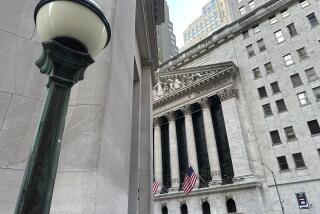Economic Data Boost Dow; Yields Drop
Blue-chip stocks rose in a late rally Tuesday, boosted by positive inflation data, but investors were still cautious as they waited for the other pieces of the economic puzzle to fall into place.
The Dow Jones industrial average ended up 47.34 points at 5,481.93 after losing 38 points on Monday. Bond yields fell modestly.
For the second day in a row, trading was subdued at 341 million shares on the New York Stock Exchange. Monday’s volume of 281 million shares was the smallest so far this year.
“There’s relief the economic news [Tuesday] did not point to an imminent [Federal Reserve Board] tightening so portfolio managers got up the guts to go out and buy a bit,” said Michael Metz, chief investment strategist at Oppenheimer & Co.
The Labor Department said that wages and benefits of U.S. workers grew by a moderate 0.8% in the second quarter.
The increase in the employment cost index was slower than analysts had expected and should help dampen, but not extinguish, worries that inflation is creeping up due to wage increases.
The index, which typically has generated little interest in financial markets, has received a great deal of attention recently after Federal Reserve Board Chairman Alan Greenspan remarked on the index in his recent Humphrey-Hawkins testimony to Congress.
Greenspan expressed concern that rising wages might boost the overall inflation rate, and said the Fed stands ready to slow the economy to keep that from happening.
In other reports Tuesday, the Conference Board reported that July consumer confidence jumped to a six-year high of 107.2, against expectations for a 99.1 reading. Also, the Commerce Department said June new single-family home sales fell 5.3% to an annual rate of 734,000 units versus an expected 778,000 rate.
“The data today was encouraging enough to turn bonds back again,” said Thom Brown, a managing director at Rutherford Brown & Catherwood.
Yields eased, with the 30-year Treasury yield falling to 7.03% from 7.09% on Monday.
But while the Dow was up 0.9% for the day, broader indexes lagged. The Nasdaq composite index of mostly smaller stocks added just 0.5% to 1,071.95, and falling stocks narrowly outnumbered losers on the Nasdaq market, even though winners had the edge on the New York Stock Exchange.
Among Tuesday’s highlights:
* Stronger technology issues included IBM, up 2 5/8 to 107 3/8; Compaq, up 3 1/8 to 54 3/8; Hewlett-Packard, up 1 1/8 to 43 1/2; Intel, up 1 5/8 to 74 3/8; and Microsoft, up 1 3/4 to 118 5/8.
Also, Digital Equipment rose 3/4 to 36 1/8 after reporting earnings that were in line with expectations. DEC also announced plans to buy back up to 10 million shares of common stock.
* Consumer stocks also were strong as investors sought companies that have somewhat reliable revenues regardless of economic conditions. Philip Morris shares rose 1 1/4 to 103, and Disney rose 1 7/8 to 55 1/4.
* On the downside, Healthsource was the most active NYSE issue, with a loss of 1 3/4 at 11 1/4 after the HMO warned that its second-quarter earnings would fall far short of analysts’ expectations. Merrill Lynch, Morgan Stanley, Bear Stearns and Alex Brown downgraded the stock. Among other HMOs, Oxford Health lost 2 1/8 to 35 7/8, PacifiCare “A” shares fell 1 1/2 to 66 1/2 and Foundation Health lost 1 1/8 to 24 3/4. Aetna, which recently acquired U.S. Healthcare, fell 1 to 58 3/4.
* Comshare slumped 31% or 7 3/4 points to 17 3/8. The software maker said it will delay the release of its fiscal fourth-quarter results from July 31 until Aug. 7 since it has not yet completed an audit of its British subsidiary Overseas, Tokyo’s Nikkei stock average fell 0.4%, Frankfurt’s DAX index fell 0.8%, and London’s FTSE-100 fell 0.3%.
Oil prices closed higher Tuesday in light trading ahead of a meeting expected to iron out remaining problems holding up oil sales by Iraq.
At the New York Mercantile Exchange, September oil futures closed 5 cents a barrel higher at $20.33.
A United Nations sanctions committee meeting Wednesday is expected to agree on final details for implementation of a May 20 deal with Iraq, paving the way for Baghdad to export crude for the first time in six years to pay for humanitarian aid.
“I think the U.S. has to give in on Iraq now,” said analyst Charles Gray at Prudential Bache. “It’s the beginning of the end for sanctions.” Oil product prices closed higher ahead of weekly American Petroleum Institute stocks data due after the close.
Market Roundup, D6
More to Read
Inside the business of entertainment
The Wide Shot brings you news, analysis and insights on everything from streaming wars to production — and what it all means for the future.
You may occasionally receive promotional content from the Los Angeles Times.










